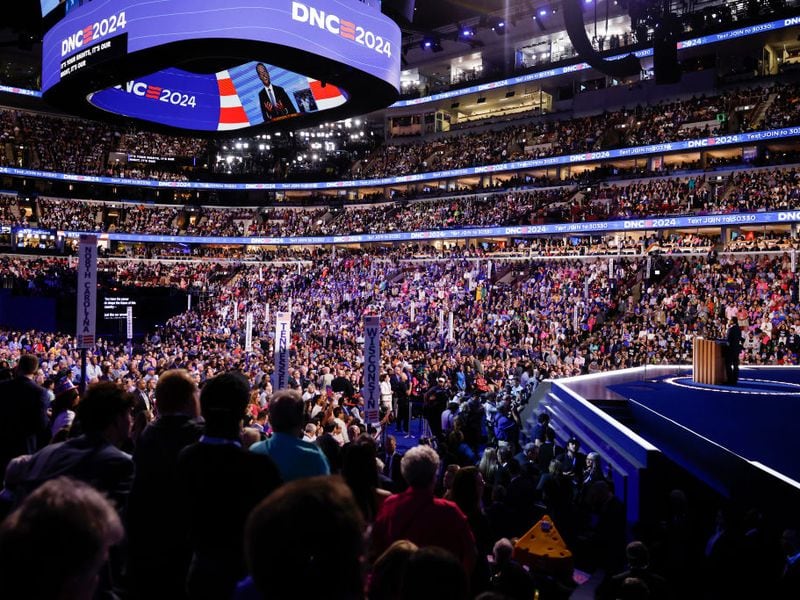
没有什么能比得上政治大会。爱国歌曲和演讲的盛大场面。党派领袖的一连串演讲。当然,还有成千上万的气球如雪花般落下,覆盖新提名的总统候选人。
然而,对于加密货币来说,今年8月的民主党全国代表大会尤为重要。尽管拜登政府的某些部分对加密货币持开放敌意,但这是加密货币首次受到欢迎。这是合理的:根据 Paradigm 对民主党选民进行的一项民意调查,加密货币持有者现在约占所有注册民主党选民的20%。如果其中一些民主党人转向共和党的选票,可能会对选举结果造成严重风险,而这场选举可能在微弱的优势中取胜。考虑到共和党公开并积极地争取加密货币,加密货币在民主党全国代表大会上的亮相表明该行业终于开始真正具有两党色彩。在芝加哥的现场,人们亲眼见证了民主党对这一领域兴趣的蓬勃发展。
虽然大部分关注加密货币的讨论都是在幕后进行的,但主会场也透露出加密货币日益重要的迹象。像得克萨斯州代表 Jasmine Crockett 女士和阿拉巴马州国会候选人 Shomari Figures 等年轻的支持加密货币的国会议员和国会候选人都获得了重要的演讲机会。一些加密货币公司还在大会场外举办了与政策制定者的讨论,就像其他公司和组织几十年来一直在做的那样。副总统哈里斯本人在她的主题演讲中强调了建立“机会经济”的重要性,并特别赞扬了创始人在使美国繁荣方面的作用。
然而,这只是政治冰山的一角。在黄金时段观看大会节目时很容易忘记,但政治大会远不止是几个小时的短暂演讲和精彩视频。大会基本上是让政党成员每隔几年在一个物理空间聚集起来,既是为了社交,也是为了制定战略。
作为这一共同过程的一部分,整个周都充满了小组讨论、会议,甚至新闻采访,所有这些都旨在帮助党派就其政策观点、目标,甚至信仰达成共识。这些是真正构成我们分散式政党的中间材料。而正是在这里,加密货币真正得以发声。
在这一周里,有关加密货币工作原理的基础知识和民主党如何修复与加密货币的紧张关系的小组讨论。讨论了维护美元霸权和稳定币的重要性。还有频繁的咖啡和饮水机讨论,与数十名政策制定者讨论他们如何吸引加密货币持有者。
在与众多不同政策制定者和意见领袖的交谈中,我们最触动的不是支持加密货币的政策制定者的声明,而是持怀疑态度者。甚至一些坚定的加密货币怀疑者表示,证券交易委员会目前的仅执行方法并不奏效,需要立法。作为多年来一直呼吁合理立法的人,这对我们来说是一种鼓舞。
另一个特别引人注目的部分是这种普通性。政策制定者对加密货币感到好奇,既对其工作原理感到好奇,也对其在今年选举中的参与感到好奇。但这种好奇并没有像去年在华盛顿对加密货币的一些讨论那样带着鼻孔朝上的态度。相反,我们被视为另一个年轻而新颖的行业,政策制定者正在努力理解。
哈里斯竞选活动强调了这种平凡的正常性,当其在一次与竞选活动政策总监布莱恩·纳尔逊的新闻采访中宣布“支持”加密货币在美国的增长。尽管人们对纳尔逊对加密货币的观点感到焦虑,因为他最近担任了财政部反恐和金融情报副部长,但纳尔逊在民主党全国代表大会的第三天宣布,哈里斯政府将“支持”加密货币在美国的增长。这一声明非常引人注目,因为加密货币已经遭受了多少政治战争,但又非常普通。为什么美国总统不希望一个行业继续设立总部在美国呢?
自从民主党全国代表大会以来,我们两人继续与来自各个政治光谱的政策制定者和候选人会面,引人注目的是,无论是与民主党人还是共和党人进行的大多数对话都是如此相似。
决策者们对盖恩斯勒主席领导下证监会的做法感到厌倦(在某些情况下甚至感到震惊)。他们希望保护和促进美国的国家安全和经济利益。总的来说,他们深切关注无意中将技术优势让给其他司法管辖区的问题,就像半导体一样。
最重要的是,一种对加密货币的简单接受的总体感觉弥漫在芝加哥。民主党人要真正找到可行的解决方案来规范加密货币还有很长的路要走,但建立某种东西的第一步是承诺去做。我们很高兴看到副总统哈里斯最近承认需要鼓励数字资产技术;虽然我们可能没有民主党将如何重置与加密货币合作的详细计划,但民主党全国代表大会和最近的Crypto4Harris活动表明,民主党人不再默认质疑加密货币是否有存在的权利。这是值得庆祝的进步,可以用放气球的方式来庆祝。
注:本专栏中表达的观点属于作者个人观点,不一定代表CoinDesk,Inc.或其所有者和关联公司的观点。
免责声明:本文章仅代表作者个人观点,不代表本平台的立场和观点。本文章仅供信息分享,不构成对任何人的任何投资建议。用户与作者之间的任何争议,与本平台无关。如网页中刊载的文章或图片涉及侵权,请提供相关的权利证明和身份证明发送邮件到support@aicoin.com,本平台相关工作人员将会进行核查。




